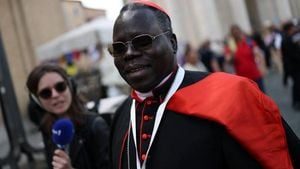Former Australian of the Year Professor Richard Scolyer has come to terms with devastating news: his brain cancer has returned, and doctors have only provided him with three months to live. The distinguished pathologist, recognized for his work with melanoma and his groundbreaking research, revealed the prognosis during an emotional interview on Monday night.
At just 58 years old, Scolyer's battle with aggressive glioblastoma—a form of brain cancer—has been marked by determination and hope for future patients. Diagnosed initially in June 2023, he bravely volunteered to be 'patient zero' for innovative brain cancer treatment. Following various experimental therapies, he had declared himself cancer-free just months ago. "I feel lucky to have been able to go for so long without recurrence," he shared.
On March 3, 2025, doctors performed surgery to investigate changes observed during scans of his brain. Unfortunately, the results showed aggressive tumors, forcing Scolyer to confront the reality of his condition. Posting on social media, he stated, "Unfortunately, there is a larger volume of quickly growing brain cancer (glioblastoma) in my left brain. The prognosis is poor." This news not only shocked his family but also sent waves of sorrow across Australia, where he is widely respected.
Scolyer's struggle was recounted through his poignant appearance on the current affairs program, A Current Affair, where host Ally Langdon fought back tears. The gravity of Scolyer's situation became starkly apparent when he stated, "It could be a few weeks, it could be a few months, it could be longer; I don't know. I'm not ready to go yet. I love my life. I’m still not ready to die." His emotional transparency resonates deeply—each word shedding light on his inner conflict between hope and despair.
Adding to the heartbreak, Scolyer revealed to Langdon and viewers his intention to focus on spending quality time with his wife, Katie, and their three children. "There’s some treatment that's being tested, but my heart's not in the same place as it was before," he expressed, underscoring the emotional toll of his diagnosis. Further surgery and radiation therapies are no longer viable options, leaving him with limited courses of action.
The professor's influence extends beyond his personal health crisis. Scolyer and his colleague Professor Georgina Long were jointly awarded 2024 Australians of the Year for their significant contributions to melanoma research. Their work, especially the development of combination immunotherapy treatments, transformed perspectives on cancer therapies. Scolyer’s groundbreaking experience made him the world's first brain cancer patient to undergo pre-surgery combination immunotherapy, reflecting his commitment to advancing medical knowledge.
His social media blog has amassed over 28,000 followers, where he shares insights from his personal battle and promotes awareness about the treatment options available for cancer patients. Commenters on his posts have expressed deep sympathy and admiration, recognizing the importance of his work and the impact he continues to have. One supporter wrote, "Your work and life are meaningful; your personal story has reached people far and wide."
Throughout his career, Scolyer has been driven by the belief of making the most out of life. He has always encouraged finding strength through adversity and reminded his followers, "It's not fair, but there's a lesson for everyone. You make the most of your life, your time. You just don’t know what’s going to happen around the corner." His reflections on living life to the fullest amid uncertainty have inspired many.
The medical community remains hopeful, as Scolyer's experiences could contribute significantly to the research surrounding brain cancer treatments. The insights he provides about his own treatment process and its potential can pave the way for future innovations. Professor Scolyer concluded his heartfelt message with gratitude: "I greatly appreciate the support of all my family, friends, and colleagues who have been caring for me so well. I hope the research will change the field and patient outcomes soon."
It is clear, Richard Scolyer embodies the spirit of resilience—facing challenges with hope and determination, highlighting the urgency for continued research and the need to advocate for cancer care. His story stands as both a poignant reminder of the battle against cancer and the significant strides made through determination and innovation. With the recurrence of his cancer, the theories of treatment he once championed now become personal; his narrative not only sheds light on his individual struggle but also serves as a beacon for others facing their own battles against this insidious disease.



